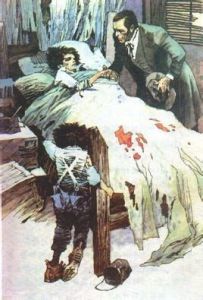教學過程
第一課時
〈一〉、揭示課題:
1、出示課題。
2、介紹時代背景:
《小珊迪》一文原名《賣火柴的小男孩》,文章的主人公就是小珊迪。他是英國人,生活在100多年前的資本主義社會裡,這是個非常感人的故事。我們一起讀讀課文的最後一段。
〈二〉、讀最後一段,設疑激趣:
1、齊讀。
2、“誰讀了這個故事不受感動呢?”換個說法意思不變。
3、讀了這段你會有什麼問題要問?
1)、“這個故事”是一個什麼故事?
2)、小珊迪那美好的品質是什麼品質?
3)、“飽受饑寒”是什麼意思?
4、我們一起來學習這個故事,解決這些問題。
〈三〉、自學課文:
自學要求
1、自學生字詞:
2、弄清故事發生的時間、地點、主要人物以及故事發生後怎樣一步步發展的,結局又是怎樣?
〈四〉、自學檢查:
1、出示生字詞,著重提示:“薄”和“軋”是多音字。“又薄又破”一詞中的“薄”讀báo,“單薄”一詞中的“薄”讀bó。“軋過去”中的“軋”讀作yà,而“軋鋼”一詞中的“軋”則讀作zhá。“乞”要與“氣”相區別,前者比後者少一橫,最後一筆的寫法也有不同。
2、這篇課文主要講了一件什麼事?(這篇課文介紹了靠賣火柴維持生活的孤兒小珊迪,在為“我”換零錢穿過馬路時,不幸被馬車軋斷雙腿,臨死前託付弟弟還零錢,牽掛著弟弟沒人照顧,最後悲慘死去的故事,讚揚了小珊迪誠實、善良的品質。)
3、開始怎樣?後來怎樣?結果又是怎樣呢?請填寫下表:
(1)地點人物事情
白天旅館前小男孩、“我”、同事買火柴
晚上旅館裡弟弟、“我”找便士
告訴情況
晚上珊迪住處珊迪、弟弟、“我”珊迪死去
(2)根據表上填的內容給課文分段
課文按事情發展的順序敘述。先講白天發生的事情:小男孩乞求“我”買火柴,“我”沒有零錢,小男孩去換零錢,卻沒有回來。接著講晚上發生的事情:小珊迪的弟弟來送找回的零錢,告訴“我”小珊迪被馬車軋傷,“我”去看小珊迪,快要死的小珊迪最牽掛的是弟弟;最後,他悲慘死去。
第二課時
〈一〉、引入:這節課,我們一起細細地學習課文,一起來看看飽受饑寒的小珊迪有著怎樣的美好品質。
〈二〉、學習第一段:
1、師範讀。
2、討論:小珊迪為什麼非要我買他的火柴?(飽受饑寒)板書
3、文中哪些地方看出他飽受饑寒?板書:
身:單衣
外貌:臉:發青寒冷
腳:通紅飽受饑寒
請買請求
語言:一個便士一盒↓飢餓
一個便士兩盒
現在就買吧乞求
小珊迪先後幾次請求先生買他的火柴?四次請求先生買火柴的態度和說的話有什麼變化?(請求的口氣一次比一次迫切,話語一次比一次可憐。)
這說明了什麼?(飢餓)
指導朗讀:
(1)用一次比一次迫切的迫切的乞求的語氣讀小珊迪的四次對話。
(2)分角色朗讀。
4、小珊迪去換零錢,過了很久沒有回來,開始作者以為自己上當了,後來卻改變了看法,斷定小珊迪不是那種人。
討論課後練習3(1)
你們說作者這時候會怎么想?
5、小結:飽受饑寒的小珊迪為了掙錢餬口,大冷天在街上賣火柴。現在換零錢去了。他到底是不是那種人呢?我們接著看課文的第二段。
〈三〉、學習課文第二段:
1、指名讀第二段。
2、小珊迪為什麼遲遲不來?他的傷勢怎樣呢?
3、小珊迪被軋傷了,快要死了,可他還叫他的弟弟送回了四個便士。從這送回的四個便士你們體會到什麼?(誠實)
板書:送零錢誠實
4、指導朗讀:弟弟傷心的語氣。
〈四〉、學習第三段:
小珊迪臨死前除了掛念著要還作者錢之外,還牽掛著什麼呢?
1、指名讀。
2、小珊迪臨死前掛念著什麼?板書:掛念弟弟
3、看圖:圖上畫的是什麼地方?這地方怎樣?說明什麼?圖上有誰?他們的神情怎樣?
4、小珊迪已經奄奄一息了,還擔心弟弟無人照顧,說明什麼?(善良)
板書:善良
5、“我為什麼握住小珊迪的手並願意照顧小利比?(被小珊迪誠實、善良的品質感動了)板書:美好品質
6、指導朗讀。(同情的語調讀敘述部分、悲傷的語氣讀小珊迪臨死前說的話。)
〈五〉、分角色朗讀課文:
〈六〉、總結課文:
1、讀完這個故事,你的心被打動了嗎?什麼地方最令你感動?
2、小結:小珊迪是窮苦的孤兒,他飽受饑寒,非常需要錢,但是在他被馬車壓成重傷後,想的是讓弟弟把零錢給先生送去,這是多么誠實的一個孩子呀!小珊迪雖然年齡不大,生活又那么困難,卻擔負著照顧弟弟的重任,臨死前,他最掛念弟弟無人照顧,當先生答應照顧他弟弟時,他又是那樣感激,小珊迪多么善良,他的心靈多么美好呀!
原文
THE LITTLE MATCH-BOY.
One very cold day, not long ago, in Edinburgh, two gentlemen were standing at thedoor of a hotel. A little boy with a thin blue face, his feet bare and red with the cold, and with nothing to cover him but a bundle of rags, came to them and said:"Please, sir, buy some matches."
"No, I don't want any." answered one of the gentlemen.
"But they are only a penny a bog." pleaded the poor little fellow.
"Yes, but, you see, we don't want a bog." the gentleman said again.
"Then I will give you two boxes for a penny." the boy said.
At last. "So, to get rid of him," said the gentleman to me."I bought a bog." Then, finding I had no change, I said to him,"I will buy a bog to-morrow."
"Oh, please buy them tonight." the boy pleaded again:"I will run and get you the change, for I am very hungry."
So I gave him the shilling, and he started away. I waited for him, but no boy came.
I thought I had lost my shilling. still, there was something in the boy's face I trusted, and I did not like to think bad of him.
Late in the evening I was told that a little boy wanted to see me. I found, when he was brought in, it was a smaller brother of the boy who took my shilling. but, if possible, still more ragged and poor.
He stood a moment, diving into his rags as if he were seeking something, and thensaid:"Are you the gentleman who bought the matches from Sandy."
"Yes."
"Well, then, here are fourpence out of your shilling. Sandy cannot come. he's very sick. A cart ran over him and knocked him down. He lost his cap and matches and seven pence of your money. Both his legs were broken, and the doctor says he'll die, and that's all."
I fed the little fellow, and then went with him to see Sandy. I found that the two children lived almost alone, for their father and mother were dead.
Poor Sandy was lying on a bundle of shavings. He knew me as soon as I wentin, and said:"I got the change, sir, and was coming back, but the horse knocked me down, and both of my legs are broken! Oh, Reuby! little Reuby! I'm sure I'm dying, and who will take care of you when I am gone,What will you do, Reuby."
Then I took him by the hand, and said:"I would always take care of Reuby."
He understood me, and had just strength enough to look up to me as if to thank me. Then the light went out of the blue eyes. In a moment,
"He lay within the light of God, Like a babe upon the breast, Where the wicked cease from troubling And the weary are at rest."
That story is like an arrow in the hand of a giant. It ought to pierce many a heart, old and young.
Whenever, dear children, you are tempted to say what is not true, or to be unkind to other boys and girls, or to take what you ought not to take, remember little Sandy.
This poor little boy, lying on a bundle of shavings, dying and starving, was tender,trusty, and true. So God told the gentleman to take poor little friendless Reuben and be a friend to him. Sandy heard him say he would do it-the last thing he ever did hear.
Then the dark room, the bundle of shavings, the weary, broken limbs, all faded away, and Sandy was with the angels.
They could look at him in his new home, and say one to another,“That is the little boy who kept his word and sent back four pence. He was tender, trusty, and true, when he was hungry and faint, when both his legs were broken, and he lay dying."
This story is told you now because, whether you find it hard or easy, we want you to be tender and trusty and true as poor little Sandy was, who did not forget his promise, and who loved his little brother to the end.
DEAN STANLEY.

